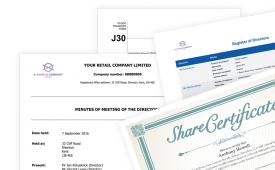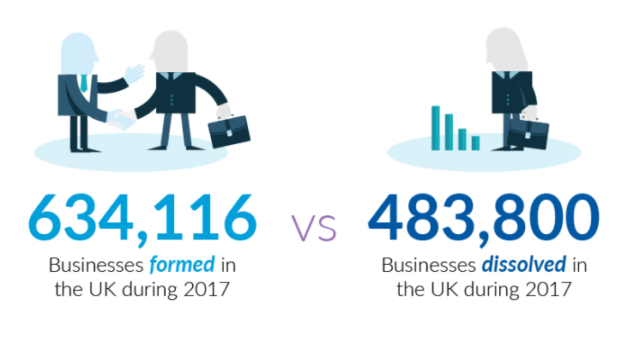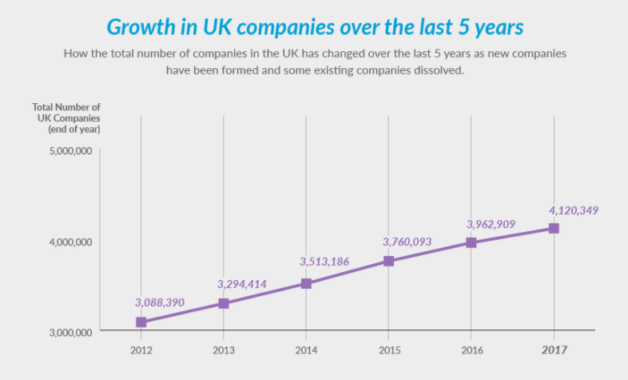We’ve again crunched the numbers and released the latest Inform Direct Review of UK Company Formations.
Based on data from Companies House and the Office of National Statistics, our study provides the most comprehensive picture of 2017 company formations and dissolutions across the UK.
As well as a national picture, we’ve broken down the data by country and individual counties, so we can track the performance of business from Cornwall to Cumbria. It’s possible to drill down still further, and look at activity in individual districts and even wards, as well as making a comparison with previous years.
Here we talk about what we’ve learnt about the state of UK business from this year’s figures.
Want to make it much easier to manage your UK company?
An important part of managing a UK company is keeping its statutory books and filings up to date.
Inform Direct is the perfect tool to help make this task a whole lot easier.
There was a lot of good news in this year’s figures. Company formations in 2017 continued to outpace those being dissolved, and by a significant margin – with 634,116 formations compared to 483,800 dissolutions, meaning there’s a net 150,316 additional companies on the UK register of companies at the end of the year. The number of UK registered companies also passed 4,000,000 for the first time ever, with 4,120,349 entities registered with Companies House at the end of the year.
But, beneath the surface, there are signs of a slowdown. The number of UK company formations was down from 2016 – 634,116 compared with 664,720, the first time we’ve seen a decrease in the number of companies being formed since the last recession. The number of companies dissolved was up to 483,800 versus 468,435 the previous year, meaning we’re also seeing more companies fail.
Overall, that means the growth rate in UK companies over 2017 stood at 4%, a significant fall from the 5.4% increase in 2016. We’ve seen 33.4% growth over the last 5 years.
Why do the numbers of company formations matter?
A slowdown in UK company formation activity is a sign of concerns in the wider economy. Often seen as a leading indicator of economic health, lower formation numbers may signal reduced confidence amongst entrepreneurs and potential entrepreneurs – with many would be business owners put off from taking the step of forming a company to pursue their ambitions. Higher numbers of business failures are also a warning sign of difficult times ahead if a lack of confidence spreads to the wider business community and consumers.
A slowing economy and political uncertainty – with the possibility of another election never that far away, with the government’s wafer thin majority to pursue important business – are likely to have played their part in fewer people looking to form companies. Legal changes affecting contractors working through their own limited companies have also reduced the number of companies formed.
More generally, the prospect of Brexit hangs over the business community. While many look forward to a new arrangement, the lack of certainty about how trade agreements will look post-Brexit makes it difficult for businesses to plan effectively, especially the many companies that trade with countries within the EU. Many will be waiting to see what the final picture looks like before pursuing their next business opportunity.
Significant regional variations
The national picture disguises significant regional variations, with many areas seeing marked variation from the 4% national growth rate in the number of companies:
- Wales actually saw a significant increase in company formations, with 17,408 new companies registered in Wales compared to 15,795 in 2016, bringing the total number of companies registered in Wales to 115,344 at the end of 2017. With 9.8% growth, up from 105,039 Welsh companies at the end of 2016, Wales had the strongest growth of any of the nations of the UK. With a massive 24% increase in companies based there, Cardiff was the best-performing area across the whole of the UK.
- Northern Ireland also saw a (very) modest increase in company formations, with 7,398 formations in 2017 compared to 7,389 in 2016. But an impressively low number of dissolutions still led to significant 6.6% growth in the Northern Irish company population, up from 55,135 at the end of 2016 to 58,754 at the end of the 2017.
- Scotland also outpaced growth in England, with 34,002 company formations resulting in 5.7% growth in company numbers north of the border. Of the 20 top performing areas of the UK, 10 were in Scotland – with Dundee (11.4% increase in companies), Midlothian (9.6%) and North Ayrshire (9%) seeing particular success. For the second year running, company formation activity was higher in Glasgow (7,003 companies formed) than Edinburgh (6,045), although overall there are still more companies that call Edinburgh home.
- Although England saw lower percentage growth – at just 3.9% – in company numbers than other areas of the UK, it still leads the country when the figures are adjusted for population. There were 10.7 formations for every 1,000 people in England, which compares favourably with 8.4 in Wales, 6.4 in Scotland and 4.1 in Northern Ireland.
- London still dominates company formation activity in England (and, for that matter, the UK as a whole). Of the 569,585 formations in England in 2017, 205,527 – so well over a third – were in London. As well as an entrepreneurial culture, easy access to services, suppliers and customers, there’s still significant appeal for many companies in having a registered office address in London, even if they do most or all of their business elsewhere.
- Outside London, the most active areas in England for company formations are Greater Manchester (31,124), the West Midlands (26,802), West Yorkshire (16,604) and Essex (15,922).
What’s the outlook for 2018?
Perhaps more than any time in recent history, there’s a wide range of possibilities for the year ahead. It’s very possible, however, that a lack of confidence could continue. If interest rates continue to creep up in 2018, the squeeze on real incomes of mortgage borrowers – especially those not prepared for an increase in their monthly outgoings – could cause a crisis of confidence to spread to consumers, with impacts on spending with UK businesses.
More clarity on Brexit, although only if it’s a direction that businesses and consumers are confident will benefit the UK economic outlook, would be beneficial in rebuilding confidence. Political uncertainty and the continued background threat of another election – unless it brings real clarity and a business-friendly direction – would not be welcome.



